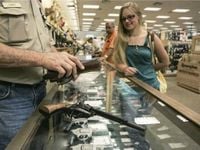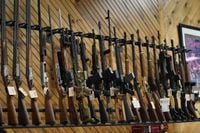In a landmark decision that’s sending shockwaves through the national debate over gun rights and regulation, the United States Court of Appeals for the Ninth Circuit has struck down California’s controversial "one-gun-per-month" law. The ruling, finalized on August 14, 2025, marks the first time the Ninth Circuit has issued a final decision invalidating a gun control measure on Second Amendment grounds—a move widely described as a historic victory for gun rights advocates and a significant defeat for California’s state government.
The law at the heart of the case, passed in 2019, prohibited individuals from purchasing more than one handgun or semi-automatic centerfire rifle within any 30-day period from a licensed dealer. According to Guns.com, the restriction was designed to limit the flow of firearms and, its supporters argued, curb gun violence and trafficking. But for many gun owners and rights groups, the law represented an unconstitutional burden on the right to keep and bear arms.
The case, Nguyen v. Bonta, was brought by a coalition of plaintiffs that included six private citizens—among them Michelle Nguyen, for whom the case is named—two federally licensed firearm dealers, and several advocacy organizations: the Second Amendment Foundation (SAF), the Firearms Policy Coalition, and the San Diego County Gun Owners PAC. As Breitbart News reported, these groups challenged the law on the grounds that it violated the Second Amendment by infringing not only on the right to possess firearms but also on the right to acquire them.
Judge Danielle Forrest, writing for the unanimous three-judge panel in a June 20, 2025 decision, made the core reasoning clear: "California’s law is facially unconstitutional because possession of multiple firearms and the ability to acquire firearms through purchase without meaningful constraints are protected by the Second Amendment and California’s law is not supported by our nation’s tradition of firearms regulation." The panel’s decision affirmed a lower court’s ruling against the law, setting the stage for the mandate issued in August that made the judgment enforceable.
One of the central legal tests applied by the Ninth Circuit was the so-called "historical tradition" standard, articulated by the Supreme Court in the 2022 New York State Rifle & Pistol Association v. Bruen decision. This test requires that any modern gun control law must be consistent with regulations that existed in the Founding era. In its analysis, the Ninth Circuit found that "the state has not demonstrated that the one-gun-per-month law is consistent with the Nation’s historical tradition of firearm regulation," as reported by the Firearms Policy Coalition. The court concluded, "We have not identified any historical tradition of banning the purchase of more than one firearm within a given time period."
Gun rights organizations wasted little time in celebrating what they see as a watershed moment. Adam Kraut, executive director of the Second Amendment Foundation, said in a statement distributed by SAF and quoted by multiple outlets, "Today’s mandate issued by the Ninth Circuit marks the first time the court has issued a final decision striking down a law for infringing on the Second Amendment. Between Heller and Bruen, every case heard by a panel which concluded the law was contrary to the Second Amendment was reheard en banc by the court and ultimately upheld. This is a historic victory for Second Amendment rights in the Ninth Circuit and marks a measurable defeat for Governor Newsom and the legislature’s attempts to curtail the exercise of the right to keep and bear arms in California."
Echoing that sentiment, Cody J. Wisniewski, president of the FPC Action Foundation and counsel for the Firearms Policy Coalition, told Personal Defense World, "California has managed to do what many thought impossible: violate the Second Amendment so blatantly that even the Ninth Circuit won’t uphold it. We are proud to have secured the rights of peaceable people and look forward to many more wins against California’s unconstitutional laws."
For supporters of the law, the Ninth Circuit’s decision is a bitter pill. The measure was part of a broader package of gun control efforts championed by Governor Gavin Newsom and the California legislature, who have frequently positioned the state as a national leader in efforts to reduce gun violence. The defeat marks a rare and significant setback for those efforts, especially given the Ninth Circuit’s reputation as one of the country’s more progressive appellate courts. As Guns.com noted, the state had until August 6 to request a rehearing but chose not to do so, effectively conceding the legal battle and allowing the court’s mandate to take effect.
Legal scholars and observers say the ruling’s implications could ripple far beyond California. The decision sets a precedent for future challenges to other gun control measures, both within the Ninth Circuit’s jurisdiction and potentially in other parts of the country. The panel’s explicit reliance on the historical tradition standard from Bruen suggests that courts may be more skeptical of contemporary gun regulations that lack clear historical analogues. As the Firearms Policy Coalition emphasized, "the Second Amendment protects the right to acquire arms, not merely to possess them."
The outcome was also notable for its finality. As reported by Breitbart News, this is "the first time a panel of this Court has invalidated a gun control measure under the Second Amendment without the full Court subsequently reversing or modifying the decision en banc." In past cases, even when a three-judge panel found a law unconstitutional, the Ninth Circuit often reheard the case with a larger panel and overturned the decision. Not so this time: California’s decision not to seek rehearing left the panel’s ruling intact and enforceable.
Alan M. Gottlieb, founder and executive vice president of the Second Amendment Foundation, summed up the mood among gun rights advocates: "Today’s mandate from the Ninth Circuit is a testament to SAF’s efforts to restore the Second Amendment rights of all Americans. This win is a huge step forward in one of the most gun-restrictive states in America, and we will not rest until Californians can exercise their full constitutional rights."
While California’s government and gun control advocates have not yet issued detailed public responses to the ruling, the decision is certain to fuel ongoing debates over the scope of the Second Amendment and the future of gun regulation in the United States. For now, the Ninth Circuit’s historic mandate stands as a defining moment in the legal and political battle over firearms—and a sign that the landscape of American gun law may be poised for further change.



